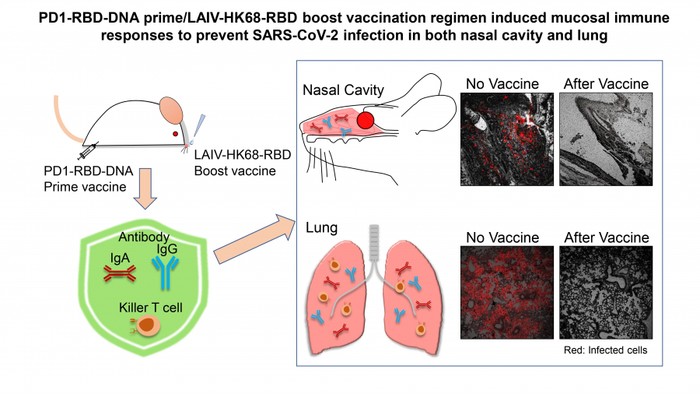PD1-RBD-DNA prime/LAIV-HK68-RBD boost vaccination regimen induced mucosal immune responses to prevent SARS-CoV-2 infection in both nasal cavity and lung. Courtesy of University of Hong Kong
Researchers at the Department of Microbiology and State Key Laboratory of Emerging Infectious Diseases, LKS Faculty of Medicine of the University of Hong Kong (HKUMed) have conducted a comprehensive study for identifying an effective vaccine regimen in preventing SARS-CoV-2 nasal infection.
The study demonstrated that a combination of intramuscular PD1-based receptor-binding domain (RBD) DNA vaccine (PD1-RBD-DNA) prime and intranasal live attenuated influenza-based vaccine (LAIV-HK68-RBD) boost vaccination regimen induced the strongest mucosal broadly neutralizing antibodies and lung resident memory CD8 T cells, which prevented live SARS-CoV-2 nasal challenges in two animal models. The full research article is now online in the journal of EBioMedicine published by The Lancet.
In this HKUMed study, substantially higher systemic and mucosal antibodies IgA/IgG and lung resident polyfunctional memory CD8 T cells were induced mainly by the heterologous combination regimen as compared with current COVID-19 vaccination regimens. When two vaccinated mouse models were challenged at the memory phase, 35 days after the second vaccination, prevention of robust SARS-CoV-2 infection in nasal turbinate was achieved primarily by the heterologous combination regimen besides consistent protection in lungs. The new regimen-induced antibodies also cross-neutralized many pandemic variants of concerns tested including Alpha, Beta and Delta. The findings provided the proof-of-concept that vaccine-induced robust mucosal immunity is necessary for preventing SARS-CoV-2 nasal infection, which has significant implication for ending the ongoing COVID-19 pandemic.
"The findings suggested that the clinical development of our two HKU vaccines remains a top priority for eliminating the uncontrolled spread of COVID-19 pandemic. We are currently testing the influenza-based nasal spray vaccine and the DNA vaccine in humans," says professor Yuen Kwok-yung, the Henry Fok Professor in Infectious Diseases and Chair of Infectious Diseases, Department of Microbiology, HKUMed, who is currently leading the clinical trials of these two vaccines in Hong Kong.
"The biggest challenge for our COVID-19 vaccine development is that we do not have a vaccine manufacturing plant in Hong Kong, which has delayed the translation of scientific discovery into clinical use. Now, we face the same challenge after we have already made the Omicron-targeted DNA vaccine for timely clinical development," said professor Chen Zhiwei, director of the AIDS Institute, a professor in the Department of Microbiology, HKUMed, who co-led the research.
"We believe that using nasal spray vaccination to build up protection in the upper respiratory tract is the key strategy to reduce transmission of SARS-CoV-2 and important for the ultimate control of COVID-19 pandemic," said professor Chen Honglin, a professor in the Department of Microbiology, HKUMed, who co-led the research.
Source: HKUMed
